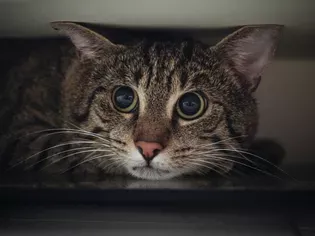Stress in Cats
Updated on 04/26/24

Unveiling the Hidden Stressors: A Comprehensive Guide to Stress in Cats
As cherished companions, cats hold a special place in our hearts. However, these feline friends can experience stress just like humans, leading to a range of physical and behavioral issues. Recognizing and addressing stress in cats is crucial for their overall well-being. This comprehensive guide delves into the causes, symptoms, and effective management strategies of feline stress, empowering you to provide a stress-free environment for your beloved pet.
Understanding the Causes of Stress in Cats
Cats are sensitive creatures that can be easily stressed by a variety of factors, both internal and external. Common stressors include:
* Environmental changes: Moving to a new home, introducing a new pet, or changing their daily routine can disrupt a cat's sense of stability and trigger stress.
* Social stressors: Interactions with other cats or animals, whether positive or negative, can lead to stress, especially in cats that are territorial or anxious.
* Medical conditions: Illness, pain, or discomfort can be significant stressors for cats, causing them to feel vulnerable and anxious.
* Cognitive stressors: Cats are intelligent animals that can experience stress due to boredom, frustration, or cognitive decline.
Recognizing the Symptoms of Stress in Cats
Cats may exhibit a wide range of symptoms when stressed, including:
* Physical symptoms: Shaking, trembling, dilated pupils, increased heart rate, panting, excessive grooming, and changes in appetite.
* Behavioral symptoms: Hiding, withdrawal, avoidance, aggression, pacing, destructive behavior, and urinary marking.
* Psychological symptoms: Anxiety, fear, depression, and cognitive impairment.
Effective Stress Management Strategies
Managing stress in cats requires a multifaceted approach that addresses both the underlying causes and the symptoms. Effective strategies include:
* Enriching the environment: Providing cats with plenty of physical and mental stimulation through toys, scratching posts, and hiding places can help prevent boredom and reduce stress.
* Establishing a predictable routine: Cats thrive on routine, so maintaining a consistent feeding, sleeping, and play schedule can provide stability and reduce stress.
* Creating a safe and comfortable space: Providing a safe and comfortable area where your cat can retreat to when feeling stressed is essential. This space should be quiet and free from potential threats.
* Addressing medical conditions: If stress is suspected to be caused by an underlying medical condition, it's crucial to seek veterinary attention promptly.
* Reducing social stressors: If your cat is stressed by other animals, consider separating them or providing separate feeding and sleeping areas.
* Using pheromone diffusers: Pheromone diffusers release synthetic hormones that mimic natural calming pheromones, creating a sense of security and reducing stress in cats.
* Administering anti-anxiety medication: In some cases, anti-anxiety medication may be necessary to manage severe stress in cats. However, this should only be done under the guidance of a veterinarian.
Preventing Stress in Cats
Preventing stress in cats is essential for maintaining their long-term well-being. Consider the following preventive measures:
* Provide plenty of exercise and playtime: Exercise helps reduce stress and provides mental stimulation for cats.
* Establish a positive relationship with your cat: Spend quality time with your cat, providing gentle petting, playtime, and positive reinforcement.
* Create a safe and supportive environment: Ensure your cat's environment is free from potential threats and provides plenty of hiding places and escape routes.
* Monitor your cat's behavior: Pay attention to any changes in your cat's behavior that may indicate stress and address the underlying causes promptly.
Conclusion
Stress is a common issue among cats that can have significant impacts on their physical and mental health. By understanding the causes, symptoms, and effective management strategies, you can create a stress-free environment for your beloved feline companion. Remember that every cat is unique, so tailor your approach to their individual needs. With love, patience, and proper care, you can help your cat live a happy and stress-free life.
Explore More Pets

Cat Behavior Problems
How to Stop Aggression in Kittens

Long-Haired Cat Breeds
Siberian Cat: Breed Profile, Characteristics, & Care

Cat Behavior Problems
How to Stop Kittens From Scratching and Biting

Long-Haired Cat Breeds
Turkish Angora: Cat Breed Profile, Characteristics & Care

Basic Training
How to Socialize Your Kitten

Short-Haired Cat Breeds
Cute Pictures & Facts About Calico Cats & Kittens

Litter Box Training
Training Your Kitten to Use the Litter Box

Long-Haired Cat Breeds
10 Fun Facts About White Cats